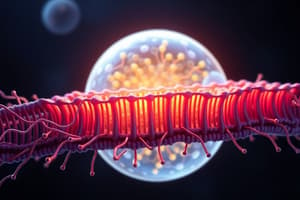Podcast
Questions and Answers
What do ion channels primarily allow to pass through them?
What do ion channels primarily allow to pass through them?
- Water molecules
- Ions of certain charge or size (correct)
- Large molecules
- Sugars and carbohydrates
What characterizes ion channels in terms of transport rate?
What characterizes ion channels in terms of transport rate?
- They are slower than carrier proteins.
- They have a very high transport rate compared to carrier proteins. (correct)
- They require ATP to function.
- They only transport one ion at a time.
Which type of gating is associated with changes in the electrical membrane potential?
Which type of gating is associated with changes in the electrical membrane potential?
- Voltage gated (correct)
- Mechanically gated
- Temperature gated
- Gap gated
Which of the following is NOT a function of ion channels?
Which of the following is NOT a function of ion channels?
What is the mechanism by which ion channels operate?
What is the mechanism by which ion channels operate?
Which of the following examples describes the role of ion channels in physiology?
Which of the following examples describes the role of ion channels in physiology?
How are ion channels categorized based on their activation mechanisms?
How are ion channels categorized based on their activation mechanisms?
What primary factor influences the selective permeability of ion channels?
What primary factor influences the selective permeability of ion channels?
Flashcards are hidden until you start studying
Study Notes
Ion Channels
- Integral proteins that allow the passage of ions through them.
- Selective Permeability: Allows only ions of a certain charge or size.
- Electrochemical Gradient: Ions pass through channels down their electrochemical gradient.
- High Rate of Transport: Channels transmit ions faster than carrier proteins (×1000).
Types of Ion Channels
- Non-gated Channels: Always open, also known as leak channels.
- Gated Channels: Open or close in response to specific stimuli.
- Voltage-Gated Channels: Activated by changes in the electrical membrane potential near the channels.
- Examples: Sodium, potassium, and calcium channels.
- Ligand-Gated Channels: Activated by binding of a specific ligand to the channel protein.
- Examples: Acetylcholine receptor, GABA receptor.
- Voltage-Gated Channels: Activated by changes in the electrical membrane potential near the channels.
Functions of Ion Channels
- Resting Membrane Potential: Setting up the resting membrane potential in all cells.
- Excitability: Essential for excitability of cells for nerve impulses, hearing, muscle contraction, and secretion of hormones and neurotransmitters.
- Cell Signaling: Involved in various signaling pathways.
- Examples: Nerve impulses, muscle contraction, hormone secretion.
- Excitation-Contraction Coupling: Control muscle contraction.
- Excitation-Secretion Coupling: Control secretion of peptide hormones and neurotransmitters.
Studying That Suits You
Use AI to generate personalized quizzes and flashcards to suit your learning preferences.



